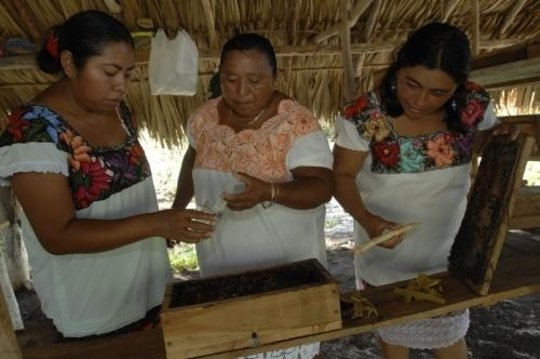In a historic resolution, the Second District Court of the state of Campeche, Mexico granted legal protection to the Mayan communities Pac-Chen and Cancabchen of the municipality Holpechen, Campeche, thus favoring their struggle against the permit granted by the Mexican Secretary of Agriculture, Livestock Raising, Rural Development, Fishing, and Food (SAGARPA) which allows planting of genetically modified (GMO) soy in the state of Campeche.

On June 6, 2012, SAGARPA, backed by SEMARNAT (Mexico´s environment and natural resources department), granted a permit which allowed genetically modified soy (MON-04-032-6) tolerant of the herbicide glyphosate to be released to the environment in a commercial phase.
Press Release from Comunidad de Pac-Chen, Comunidad de Cancabchen, Colectivo Apícola de los Chenes, Colectivo MA
This permit granted the Monsanto Corporation permission to plant 253,000 hectares of GMO soy for an unlimited time in seven Mexican States, including the following municipalities of the State of Campeche: Champoton, Hecelchakan, Hopelchen, Tenabo, Calkini, Escarcega, Carmen, and Palizada.
This story is an update of the Sustainable Pulse story from March 13 2014: Mayans Win Legal Battle to Ban GM Soya in Mexico’s Campeche Region
In response to the permit, Mayan authorities of Pac-Chen and Cancabchen presented protection lawsuits (trials 753/2012 and 762/2012, respectively). Central arguments were: a) SEMARNAT and SAGARPA failed to carry out a free prior informed consultation of the Mayan people as specified by ILO´s Convention 169; b) planting genetically modified soy affected traditional Mayan beekeeping; c) excessive use of herbicides and related deforestation violated the right to a healthy environment.
On March 7, after almost two years of litigation, the Second District Court announced a favorable resolution of the protection lawsuit 753/2012. Fundamental arguments of the Second District Judge in granting this protection were:
1. The right to free prior informed consultation, protected by Article 2 of the Mexican Constitution and the International Labor Organization´s Convention 169 was violated, given that SAGARPA, upon granting the mentioned permit did not assure the indigenous communities of their right to decisions regarding their land and territory. SAGARPA did not establish a suitable mechanism which would consider culturally adequate procedures according to traditions and customs taking into account the Mayan people´s traditional methods of decision making. The District Judge determined that effective protection of recognized indigenous rights requires guaranteeing exercise of certain human rights of a procedural nature, principally regarding access to information, participation in decision making, and access to justice.”
2. Upon backing this permit, SEMARNAT´s Environmental Impact and Risk Directorate violated procedures established in its Internal Regulation, thus ignoring the binding opinions of CONABIO (National Commission for Knowledge and Use of Biodiversity), CONANP (National Commission of Natural Protected Areas), and INE (National Institute of Ecology) which advised against planting genetically modified soy in the polygons authorized. Thus, SEMARNAT had issued a favorable opinion without justification or foundation.
Despite the fact that the suit was presented by only two communities of the municipality of Hopelchen, the Judge, by delineating the scope of the sentence in interpretation of Articles 1 and 2 of the Mexican Constitution, determined that its effects applied to all municipalities affected by the permit, thus the permit would be cancelled in the entire state of Campeche. As a consequence, SAGARPA is obliged to guarantee that no genetically modified soy is planted in the state. If SAGARPA tries to reactivate this permit in the state, it will have to comply with two requisites: a) a new environmental impact ruling which considers the opinions of CONABIO, CONANP, and INE; b) a process of free prior informed consultation of all Mayan communities in the municipalities affected by the permit, in conformity with the highest standards of protection of human rights and of original peoples.
The sentence in question claims the right of the Mayan people to be consulted and to make decisions regarding projects carried out in their communities and their territory. It highlights the obligation, ignored over decades, to consider their needs, and it demonstrates that federal and Campeche State authorities have implemented public policy which benefits a small number of people while negatively affecting a majority of the principally indigenous population of the Yucatan peninsula.
This resolution also represents an opportunity in the search for options which are compatible with the environment and with cultural practices of the region. It has been demonstrated that the practice of monoculture is damaging not only to the environment but also to the economy of the majority of the peninsula´s inhabitants, affecting maize growing and beekeeping which are integral to the region.
Finally, it should be emphasized that this sentence sets a fundamental precedent for other protection trials which have been presented against pro-GMO public policy in Mexico. Shortly, the Second District Judge will resolve protection suit 762/2012, presented by beekeeping associations of Campeche against the same permit. Also, District Judges in the Mexican states of Chiapas and Yucatan should soon resolve two protection suits presented by beekeeping associations and communities of these states. These judges should take into account the criteria established in this sentence.



















loving non gmo even more…………….